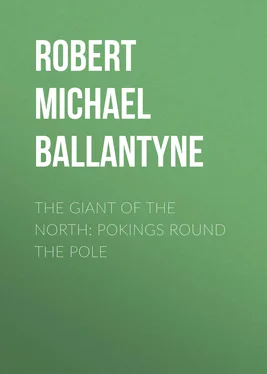Robert Michael Ballantyne - The Giant of the North - Pokings Round the Pole
Здесь есть возможность читать онлайн «Robert Michael Ballantyne - The Giant of the North - Pokings Round the Pole» — ознакомительный отрывок электронной книги совершенно бесплатно, а после прочтения отрывка купить полную версию. В некоторых случаях можно слушать аудио, скачать через торрент в формате fb2 и присутствует краткое содержание. Жанр: Детские приключения, literature_19, foreign_antique, foreign_prose, foreign_children, на английском языке. Описание произведения, (предисловие) а так же отзывы посетителей доступны на портале библиотеки ЛибКат.
- Название:The Giant of the North: Pokings Round the Pole
- Автор:
- Жанр:
- Год:неизвестен
- ISBN:нет данных
- Рейтинг книги:3 / 5. Голосов: 1
-
Избранное:Добавить в избранное
- Отзывы:
-
Ваша оценка:
- 60
- 1
- 2
- 3
- 4
- 5
The Giant of the North: Pokings Round the Pole: краткое содержание, описание и аннотация
Предлагаем к чтению аннотацию, описание, краткое содержание или предисловие (зависит от того, что написал сам автор книги «The Giant of the North: Pokings Round the Pole»). Если вы не нашли необходимую информацию о книге — напишите в комментариях, мы постараемся отыскать её.
The Giant of the North: Pokings Round the Pole — читать онлайн ознакомительный отрывок
Ниже представлен текст книги, разбитый по страницам. Система сохранения места последней прочитанной страницы, позволяет с удобством читать онлайн бесплатно книгу «The Giant of the North: Pokings Round the Pole», без необходимости каждый раз заново искать на чём Вы остановились. Поставьте закладку, и сможете в любой момент перейти на страницу, на которой закончили чтение.
Интервал:
Закладка:
“These ignorant men,” said that bold savage, “are foolish and useless. They cannot kill bears. The one named Lo, (thus was Leonard’s name reduced to its lowest denomination), is big enough, and looks very fine, but when he sees bear he only stares, makes a little click with his thunder-weapon, and looks stupid.”
“Blackbeard explained that,” said Oolichuk; “Lo made some mistake.”
“That may be so,” retorted Akeetolik, “but if you and me had not been there, the bear would not make a mistake.”
“I will not go with these Kablunets,” said Eemerk with a frown, “they are only savages. They are not taught. No doubt they had a wonderful boat, but they have not been able to keep their boat. They cannot kill bears; perhaps they cannot kill seals or walruses, and they ask us to help them to travel—to show them the way! They can do nothing. They must be led like children. My advice is to kill them all, since they are so useless, and take their goods.”
This speech was received with marks of decided approval by those of the party who were in the habit of siding with Eemerk, but the rest were silent. In a few moments Chingatok said, in a low, quiet, but impressive tone: “The Kablunets are not foolish or ignorant. They are wise—far beyond the wisdom of the Eskimos. It is Eemerk who is like a walrus without brains. He thinks that his little mind is outside of everything, and so he has not eyes to perceive that he is ignorant as well as foolish, and that other men are wise.”
This was the severest rebuke that the good-natured Chingatok had yet administered to Eemerk, but the latter, foolish though he was, had wisdom enough not to resent it openly. He sat in moody silence, with his eyes fixed on the ground.
Of course Oolichuk was decidedly in favour of joining the white men, and so was Ivitchuk, who soon brought round his hesitating friend Akeetolik, and several of the others. Oblooria, being timid, would gladly have sided with Eemerk, but she hated the man, and, besides, would in any case have cast in her lot with her mother and brother, even if free to do otherwise.
The fair Tekkona, whose courage and faith were naturally strong, had only one idea, and that was to follow cheerfully wherever Chingatok led; but she was very modest, and gave no opinion. She merely remarked: “The Kablunets are handsome men, and seem good.”
As for Toolooha, she had enough to do to attend to the serious duties of the lamp, and always left the settlement of less important matters to the men.
“You and yours are free to do what you please,” said Chingatok to Eemerk, when the discussion drew to a close. “I go with the white men to-morrow.”
“What says Oblooria?” whispered Oolichuk when the rest of the party were listening to Eemerk’s reply.
“Oblooria goes with her brother and mother,” answered that young lady, toying coquettishly with her sealskin tail.
Oolichuk’s good-humoured visage beamed with satisfaction, and his flat nose curled up—as much as it was possible for such a feature to curl—with contempt, as he glanced at Eemerk and said—
“I have heard many tales from Anders—the white man’s mouthpiece—since we met. He tells me the white men are very brave and fond of running into danger for nothing but fun. Those who do not like the fun of danger should join Eemerk. Those who are fond of fun and danger should come with our great chief Chingatok—huk! Let us divide.”
Without more palaver the band divided, and it was found that only eight sided with Eemerk. All the rest cast in their lot with our giant, after which this Arctic House of Commons adjourned, and its members went to rest.
A few days after that, Captain Vane and his Eskimo allies, having left the camp with Eemerk and his friends far behind them, came suddenly one fine morning on a barrier which threatened effectually to arrest their further progress northward. This was nothing less than that tremendous sea of “ancient ice” which had baffled previous navigators and sledging parties.
“Chaos! absolute chaos!” exclaimed Alf Vandervell, who was first to recover from the shock of surprise, not to say consternation, with which the party beheld the scene on turning a high cape.
“It looks bad,” said Captain Vane, gravely, “but things often look worse at a first glance than they really are.”
“I hope it may be so in this case,” said Leo, in a low tone.
“Good-bye to the North Pole!” said Benjy, with a look of despondency so deep that the rest of the party laughed in spite of themselves.
The truth was that poor Benjy had suffered much during the sledge journey which they had begun, for although he rode, like the rest of them, on one of the Eskimo sledges, the ice over which they had travelled along shore had been sufficiently rugged to necessitate constant getting off and on, as well as much scrambling over hummocks and broken ice. We have already said that Benjy was not very robust, though courageous and full of spirit, so that he was prone to leap from the deepest depths of despair to the highest heights of hope at a moment’s notice—or vice versa . Not having become inured to ice-travel, he was naturally much cast down when the chaos above-mentioned met his gaze.
“Strange,” said the Captain, after a long silent look at the barrier, “strange that we should find it here. The experience of former travellers placed it considerably to the south and west of this.”
“But you know,” said Leo, “Chingatok told us that the old ice drifts about just as the more recently formed does. Who knows but we may find the end of it not far off, and perhaps may reach open water beyond, where we can make skin canoes, and launch forth on a voyage of discovery.”
“I vote that we climb the cliffs and try to see over the top of this horrid ice-jumble,” said Benjy.
“Not a bad suggestion, lad. Let us do so. We will encamp here, Anders. Let all the people have a good feed, and tell Chingatok to follow us. You will come along with him.”
A few hours later, and the Captain, Leo, Alf, Benjy, Chingatok, and the interpreter stood on the extreme summit of the promontory which they had named Cape Chaos, and from which they had a splendid bird’s-eye view of the whole region.
It was indeed a tremendous and never-to-be-forgotten scene.
As far as the eye could reach, the ocean was covered with ice heaped together in some places in the wildest confusion, and so firmly wedged in appearance that it seemed as if it had lain there in a solid mass from the first day of creation. Elsewhere the ice was more level and less compact. In the midst of this rugged scene, hundreds of giant icebergs rose conspicuously above the rest, towering upwards in every shape and of all sizes, from which the bright sun was flashed back in rich variety of form, from the sharp gleam that trickled down an edge of ice to the refulgent blaze on a glassy face which almost rivalled the sun himself in brilliancy. These icebergs, extending as they did to the horizon, where they mingled with and were lost in the pearl-grey sky, gave an impression of vast illimitable perspective. Although no sign of an open sea was at first observed, there was no lack of water to enliven the scene, for here and there, and everywhere, were pools and ponds, and even lakes of goodly size, which had been formed on the surface by the melting ice. In these the picturesque masses were faithfully reflected, and over them vast flocks of gulls, eider-ducks, puffins, and other wild-fowl of the north, disported themselves in garrulous felicity.
On the edge of the rocky precipice, from which they had a bird’s-eye view of the scene, our discoverers stood silent for some time, absorbed in contemplation, with feelings of mingled awe and wonder. Then exclamations of surprise and admiration broke forth.
Читать дальшеИнтервал:
Закладка:
Похожие книги на «The Giant of the North: Pokings Round the Pole»
Представляем Вашему вниманию похожие книги на «The Giant of the North: Pokings Round the Pole» списком для выбора. Мы отобрали схожую по названию и смыслу литературу в надежде предоставить читателям больше вариантов отыскать новые, интересные, ещё непрочитанные произведения.
Обсуждение, отзывы о книге «The Giant of the North: Pokings Round the Pole» и просто собственные мнения читателей. Оставьте ваши комментарии, напишите, что Вы думаете о произведении, его смысле или главных героях. Укажите что конкретно понравилось, а что нет, и почему Вы так считаете.












